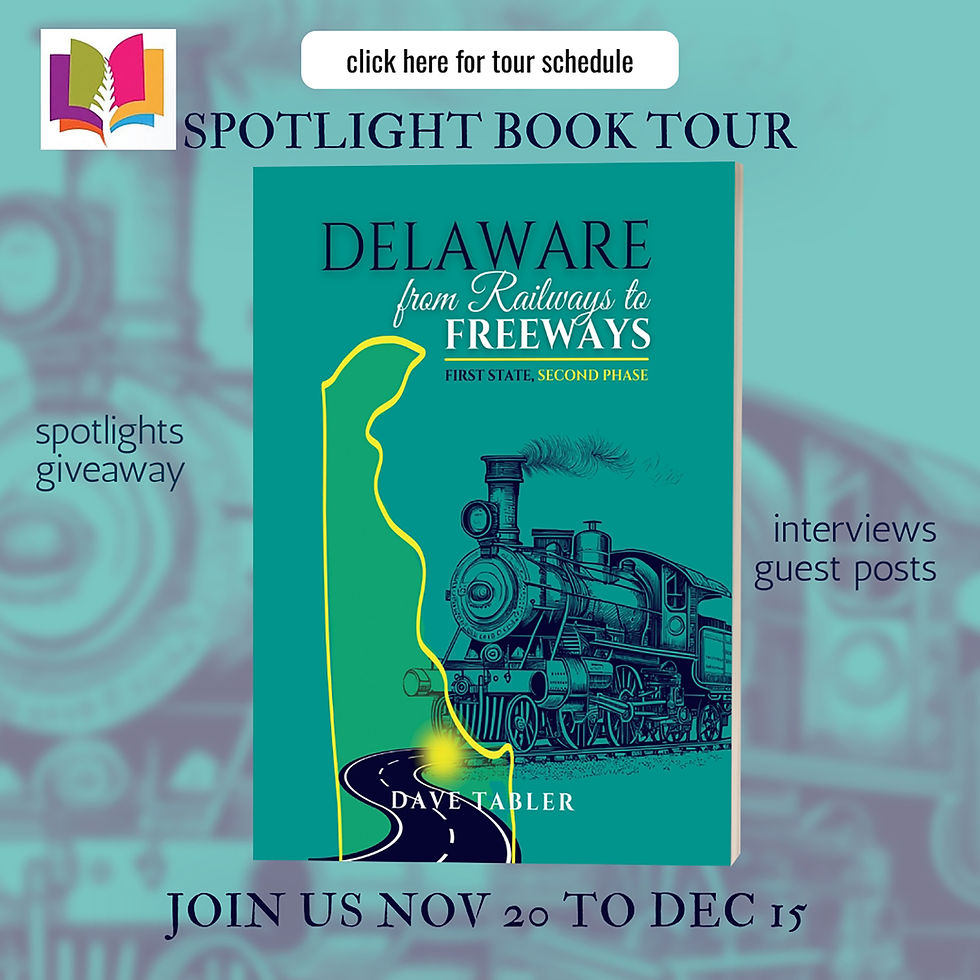How I Did My Research for "Delaware from Railways to Freeways: First State Second Phase" Guest Post
- Kim Bartosch
- Nov 29, 2023
- 3 min read
Today, I'm happy to share a guest post from author Dave Tabler "How I Did My Research for Delaware from Railways to Freeways: First State Second Phase" sponsored by iRead book tours. Check out Dave's guest post below and enter the book giveaway!

How I Did My Research for Delaware from Railways to Freeways: First State Second Phase
by Dave Tabler
My mom was a librarian. I learned from an early age that whatever it is you want to research, there are always tools and shortcuts. In her day, for example, there was a tome called “The Encyclopedia of Encyclopedias.” One would start there, find the specialized encyclopedia that dealt with one’s topic, and proceed down the rabbit hole. Now, of course, we have Wikipedia and search engines.
This past year I’ve spent a lot of time working with ChatGPT, using it both in my research and in my writing as well. It’s a real-time saver for gathering up web links on The Topic. The bot function has a couple of downsides, though. First of all, it can’t peek behind paywalls. So, the big newspaper sites are off limits, as are repositories of historic archives such as newspapers.com and ancestry.com. Second, some of the largest non-paywalled online collections have closed search systems: ChatGPT can’t access the Library of Congress, National Archives, or the Smithsonian Institution’s online collections. There’s still a lot of manual effort to do online research.
I spend a lot of time at the Delaware Public Archives for my book projects. Mercifully it’s located in Dover, where I live. Just as with the big national archive collections, the state archive has posted only a tiny fraction of its collections online. To their credit, they work hard to scan materials systematically and post them, but they can only humanly do so much. It’s a herculean task. Their collection spans hundreds of years and thousands upon thousands of documents. Much as I love online searching, there’s still a lot of rooting around in archive microfilms, microfiches, and plain old paper-based documents.
As to AI software for writing, it’s clearly in the early stages, but has already and will continue to change every author’s work process and workflow.
When I first experimented with ChatGPT, I fed it a 5,000-word document and instructed it to learn my style from that. Which it did. But here’s the kicker. If I take something I’ve just written and ask GPT to edit it “in my style,” it will always use that base document as the reference. I started to notice that every edit was pulled from the same word cloud of choices I’d made for that one document. I felt like Bill Murray in “Groundhog Day.” Wait, haven’t I seen that phrase/word editing choice suggested before?
GPT is billed as being able to learn as it goes, but I’m not convinced yet. I have no doubt some genius programmer will solve this particular stumbling block. GPT does excel at a lot of mundane editing tasks such as checking grammar, spelling, and syntax. It’s especially helpful when I need to look up synonyms for homographs such as “bass” or “tear.” I can specify the context of GPT, and it serves up only the synonyms relevant to the meaning I need. Saves the hassle of plowing through screen after screen in the thesaurus trying to find the context manually. The genie is out of the bottle. There’s no going back. I’m happy to add this new tool to my arsenal.
Thank you Dave for this wonderful insight on how to do research as well as how to use ChatGPT to help write your book. Find more about Dave Tabler's book below as well as the giveaway!



Comments